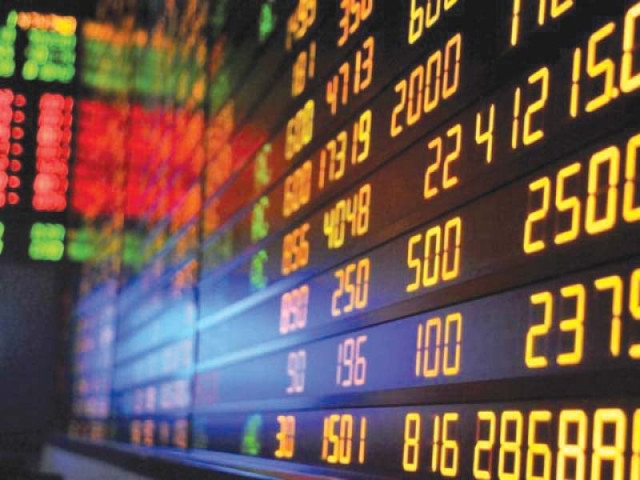Fund managers weigh in on PSX performance, economic indicators
KSE-100 shed another 0.79% or 358.78 points on Thursday as political uncertainty remains

Concerns have also been raised over the persistent net selling by foreigners even as Pakistan becomes part of the big fish in MSCI Emerging Markets. PHOTO: FILE
However, changing macroeconomic variables need to be understood in context, said Mustafa Pasha, head of investments at Lakson Investments Limited during a panel discussion recently.
Pasha was part of a panel organised by the CFA Society Pakistan to discuss the current economic situation and its impact on the country’s stock market that has seen all its gains of 2017 erode during the last one-and-a-half month.
On Thursday too, the KSE-100 Index shed 358.78 points or 0.79% to end at 45,059.93, a significant retreat from the level seen at the end of May when it ended at a record high of 52,876.46 points.
Market watch: Stocks bloodbath as Pakistan upgraded to MSCI Emerging Markets
Profit-taking after Pakistan’s inclusion in MSCI’s Emerging Markets Index, anti-budget measures announced at the end of May, and political pressure amid the ongoing Panama case has meant that not a single equity-based fund, out of a total of 20, has given a positive return to its clients in the last 180 days, according to data maintained by the Mutual Funds Association of Pakistan (MUFAP).
“It’s cyclical in nature - the economy affects policy, and policy affects the economy,” said Pasha. “Concerns over the Pakistani rupee’s strength and its devaluation driving investor sentiment have been there for two years. But there was no doubt on the government’s ability to manage the situation.
“As political pressure has ramped up, there is a fear that if there is no one at the wheel to handle the economic variables, what will happen then?”
Pasha’s statement came at the heels of a one-day depreciation of the Pakistani rupee, before it was pulled back by the country’s Ministry of Finance. However, it left a bad taste in the mouth of investors who see instability creeping in within the state institutions as pressure on Prime Minister Nawaz Sharif over allegations of money-laundering increases.
“There has been a significant reduction in the valuation of KSE-30 companies. If fears over macroeconomic imbalances materialize, we need to see the market on a sector-to-sector basis.
“Any devaluation that results in higher interest rates will help banks, textiles and independent power producers. We need to see who will benefit.”
However, concerns have also been raised over the persistent net selling by foreigners even as Pakistan becomes part of the big fish in MSCI Emerging Markets.
But Pasha said net foreign selling in 2015, 2016 as well as in the half-year period this year has amounted close to a billion dollars. “Despite that, the KSE-100 Index touched close to 53,000.
“Presence of foreign investors is important, but saying that the flows are not matching expectations and hence, we need to be bearish on the market is something I disagree with.”
Suleman Akhtar, the chief investment officer at UBL Fund Managers, said concerns over the increasing current account deficit is understandable when the economy is about to take off. “In the long-run, foreign direct investment and exports need to rise. But the situation is not as bad as the market has reacted.
“On the fundamental side, this is a buying opportunity to buy good stocks. I feel there is a good chance to make 15-20% in the next 12 months.”
SE-100 ends positive, but volume lowest in 3 years
Market watch
On Thursday, however, Pakistan equities extended losses with the benchmark KSE100 Index shedding another 0.8% on across-the-board profit-taking.
“Market opened gap up in the morning and KSE-100 Index edged up by as much as 1.3% within the first 15 minutes of trading as participants cheered overnight news that Prime Minister Nawaz Sharif and his family had acquired and submitted convincing proof to the Supreme Court to support their claims of no illegal actions in financial dealings,” stated Elixir Securities.
“However, index couldn’t sustain gains and declined to not only fill the gap but extended losses further on profit-taking and general lack of buying interest especially by local institutional investors.
“We expect volatile trading and selective participation in the near-term as anxiety over domestic politics will remain a dampener until clarity emerges,” the report added.
Overall, trading volumes fell to 148 million shares compared with Wednesday’s tally of 165 million.
Shares of 360 companies were traded. At the end of the day, value of 99 stocks closed higher, 243 declined while 18 remained unchanged. The value of shares traded during the day was Rs8.63 billion.
TRG Pak was the volume leader with 10.5 million shares, losing Rs1.05 to close at Rs36.87. It was followed by Aisha Steel Mill with 8.03 million shares, losing Rs0.78 to close at Rs18.64 and Dewan motors with 7.2 million shares, losing Rs2.03 to close at Rs38.62.
Foreign institutional investors were net sellers of Rs231 million during the trading session, according to data compiled by the National Clearing Company of Pakistan Limited.
Published in The Express Tribune, July 21st, 2017.
Like Business on Facebook, follow @TribuneBiz on Twitter to stay informed and join in the conversation.


















COMMENTS
Comments are moderated and generally will be posted if they are on-topic and not abusive.
For more information, please see our Comments FAQ